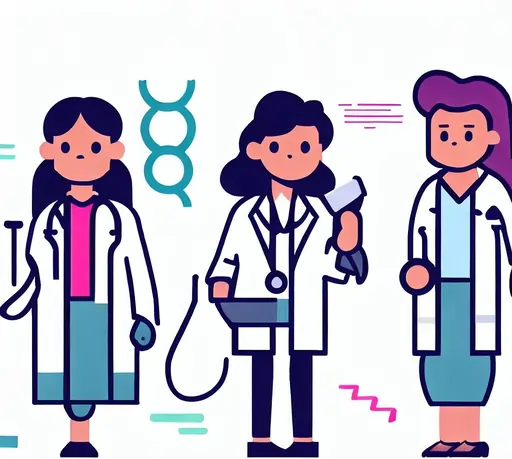Genetics in Healthcare: Implications for Nurses

In the rapidly evolving field of healthcare, genetics has become a pivotal aspect of patient care and disease management. For nurses, understanding the implications of genetics in healthcare is not only crucial for providing personalized patient care but also for academic excellence. Genetic and Genomic Nursing is a specialized field that holds immense significance, especially for nursing students. In this blog post, we will delve into the world of Genetics in Healthcare, explore its implications for nurses, and guide students on how to complete their nursing assignment related to this fascinating topic effectively.
Understanding Genetics in Healthcare
Genetics in healthcare involves the study of how an individual's genes and genetic makeup influence their susceptibility to diseases, their response to treatments, and their overall health. This knowledge allows healthcare professionals, particularly nurses, to offer tailored care plans that consider a patient's genetic predispositions. Here are some key aspects of genetics in healthcare:

Risk Assessment:
Genetic and genomic nurses play a pivotal role in assessing a patient's genetic risk factors for various diseases. This process involves analyzing an individual's genetic makeup to identify specific gene mutations or variations associated with a higher risk of certain health conditions. Here's how this aspect is significant for nursing:
- Personalized Care: By understanding a patient's genetic predispositions, nurses can tailor healthcare plans to address their unique needs and risks. This personalization can lead to more effective prevention and early intervention strategies.
- Preventive Strategies: Armed with genetic information, healthcare providers can develop targeted preventive strategies. For instance, if a patient has a genetic predisposition to certain cancers, nurses can recommend regular screenings or lifestyle modifications to mitigate the risk.
- Informed Decision-Making: Nurses can assist patients in making informed decisions about genetic testing, especially when there is a family history of hereditary diseases. They can explain the benefits and limitations of genetic testing, ensuring that patients understand the implications of their choices.
Medication Management:
Genetics significantly influences how individuals metabolize medications. Genetic variations can impact the effectiveness and safety of drugs. This aspect is crucial for nursing, as it directly affects patient outcomes:
- Optimizing Treatment: Nurses need to be aware of genetic variations that affect drug metabolism. For example, some individuals may be poor metabolizers of certain medications, leading to a need for dosage adjustments or alternative medications.
- Preventing Adverse Reactions: Knowledge of a patient's genetic profile allows nurses to anticipate and prevent adverse drug reactions. This proactive approach enhances patient safety and improves treatment outcomes.
- Personalized Medication Plans: Genetic information can guide nurses in developing personalized medication plans, ensuring that patients receive the most effective and safe treatments tailored to their genetic makeup.
Counselling:
Genetic counselling is a vital component of genetics in healthcare. Genetic counsellors and nurses in this field provide essential support to individuals and families dealing with genetic conditions. Here's why this aspect is invaluable:
- Emotional Support: Dealing with genetic conditions can be emotionally challenging for patients and their families. Genetic counsellors and nurses offer a supportive and empathetic presence, helping individuals cope with the psychological aspects of genetic diagnoses.
- Information Sharing: These professionals are experts in translating complex genetic information into understandable terms. They empower patients to make informed decisions about their healthcare, including family planning and genetic testing.
- Ethical Guidance: Genetic counsellors and nurses are well-versed in ethical dilemmas related to genetic information. They assist patients in navigating ethical issues, such as disclosing genetic information to family members.
New Horizons:
Advances in genetics have ushered in a new era of healthcare, with groundbreaking therapies like gene therapy and personalized medicine. Nurses must stay informed about these developments to provide cutting-edge care:
- Patient Education: Nurses play a crucial role in educating patients about the potential benefits and risks of emerging genetic therapies. They help patients make informed decisions regarding participation in clinical trials or the adoption of new treatments.
- Collaboration: As genetics and genomics become integral to healthcare, nurses must collaborate with genetic specialists, researchers, and other healthcare professionals to ensure seamless patient care. This collaboration fosters an interdisciplinary approach to patient management.
- Continuing Education: To stay up-to-date with the latest advancements, nurses should engage in continuous learning and professional development. Seminars, workshops, and online courses can help them keep pace with the evolving field of genetics in healthcare.
Implications for Nursing Students
For nursing students, studying genetics in healthcare opens up a world of possibilities and challenges. Here's how genetics and genomic nursing can be both rewarding and demanding:
- Educational Foundation: Building a strong foundation in genetics is essential. Students should pay close attention to genetics courses and seek additional resources to deepen their understanding. Websites like nursingassignmenthelp.com offer valuable content and assistance in grasping genetic concepts.
- Practical Application: Genetics in healthcare is not limited to theory. Students should actively seek clinical experiences or simulations that allow them to apply their knowledge. Understanding how to obtain and interpret genetic data is a crucial skill.
- Stay Updated: The field of genetics is dynamic, with discoveries and technologies emerging regularly. Nursing students should make it a habit to stay updated on the latest research and developments in genetics.
- Assignment Assistance: When it comes to assignments related to genetics in healthcare, students can benefit from professional assistance. Services like nursingassignmenthelp.com can provide guidance, resources, and expert writers who can help students excel in their assignments.
How to Solve Your Nursing Assignments on Genetics in Healthcare
Assignments on genetics in healthcare can cover a wide range of topics, from case studies to research papers. Here's a step-by-step guide on how nursing students can approach these assignments:
- Understanding the Assignment: Carefully read the assignment prompt to grasp its requirements. Identify key elements such as the topic, format, and submission deadline.
- Topic Selection: If the assignment allows for topic selection, choose a subject that interests you. Selecting a topic you're passionate about can make the research and writing process more enjoyable.
- Research: Begin your research by consulting reputable sources such as peer-reviewed journals, textbooks, and academic databases. Make note of relevant studies, statistics, and expert opinions.
- Outline: Create an outline for your assignment. Organize your research findings into a logical structure with an introduction, body paragraphs, and a conclusion.
- Writing: Start writing your assignment based on the outline. Ensure that you cite your sources properly using the preferred citation style (e.g., APA, MLA).
- Review and Edit: After completing your draft, take the time to review and edit your work. Check for clarity, coherence, grammar, and spelling errors. Consider seeking feedback from peers or using professional editing services.
- Seek Assistance: If you encounter difficulties or require additional support, don't hesitate to seek assistance from nursingassignmenthelp.com. Their team of experts can provide valuable insights and help you refine your assignment.
Conclusion
Genetics in healthcare is a vital field for nurses, offering a deep understanding of how genetics influences patient care. For nursing students, excelling in assignments related to genetics and genomic nursing is not only an academic requirement but also a pathway to becoming a competent and compassionate nurse. By following the steps outlined in this blog post and seeking further help with your nursing assignment when needed, you can navigate the world of genetics in healthcare successfully and contribute to the future of personalized patient care.